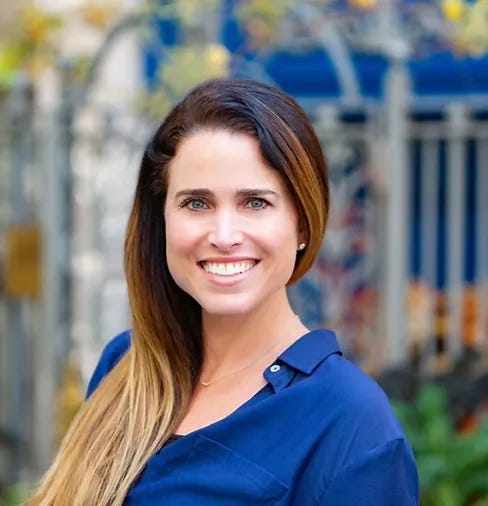Melissa: Hi, everybody. Welcome back to the Reframing Neurodiversity podcast. I am so excited to be here with Brooke Schnittman. Brooke is the founder of Coaching with Brooke, an executive function coaching company for students and adults.
Brooke has dedicated her life to helping thousands of people with ADHD shift away from chaos, frustration, and shame, and move towards tools that help them focus and thrive. I am so happy to have you here with me today, Brooke. Welcome.
Brooke: Thank you for having me, Melissa. It's a pleasure.
Managing ADHD as a Parent
Melissa: I'm a mom with ADHD who is raising children with ADHD, and so I'm really curious to talk to you today about that perspective. Because for me, as a mom navigating my own challenges that come with that neurowiring and then being in a position to be a leader for my kids who have similar challenges, it can be really tough.
So I'm just curious, what is your approach in helping parents navigate this train when they're in it themselves?
Brooke: Yeah. I empathize with you because I'm also in the same situation. I am a mom with ADHD, two step-sons with ADHD, and my husband also has ADHD, and we have a toddler displaying those ADHD symptoms.
It can be difficult because you might be frustrated with your own unmanaged ADHD and have less patience and tolerance for your children who are also needing help with their executive dysfunction.
So manage yourself first, always, so you have the space for your children, whether you're ADHD or not. If your brain is chaotic and you're in a constant state of chaos, it's going to come off for your children that way.
And they are going to receive the less calm version of you, which might spike some of their rejection, resistance and opposition. So it's really important just to be in a place of calm before you're managing the household.
Executive Function and Emotional Regulation Challenges
Melissa: So we know that with ADHD, executive function and emotional regulation challenges pop up. Do you feel like there is an intersection where the challenges with emotional regulation impact our executive function?
Brooke: A hundred percent. If you are not regulated, your executive function shuts down. So if you have trauma from the past, if you're in a constant state of fight or flight, or you are defensive, or you have rejection sensitivity, your executive functions are not managed properly, and it's not going to be regulated.
If you're not:
Sleeping well
Eating well
If you are not having healthy hygiene habits for your brain and your body
your emotional regulation is going to be more negative. And again, your executive functions are not going to work properly. Your emotions are very involved in your executive function.
So Dr. Thomas Brown has the model of executive functions in the ADHD brain. And he talks about six different clusters that work simultaneously together. And one of those are emotions.
So if we can't regulate our emotions, you can try to be the most productive person in the world. However, you're going to burn out, you're going to shut down, and you are not going to be your optimal peak performance.
Melissa: Oh for sure. So how do we tease apart if we know that the challenges with emotional regulation and often being more highly sensitive as people with ADHD. How do we sort of like pull those things apart and know that we're treating the right thing or providing tools for ourselves and our kids for what's really causing whatever's going on?
Brooke: Yeah, I think that mindfulness and meditation is so important. And awareness. So if you're in a constant state of chaos, it's hard to know what calm is.
Working with someone who can possibly mirror what you're feeling and help you to set boundaries for yourself. And mindfulness I know is being taught more as well nowadays.
So really starting with that and making sure that if you:
Go to therapy
Exercise
See a coach
See a consultant
If you have a friend or a loved one who can help you understand and work through the ADHD chaos
so you can prioritize your social, emotional, and mental well being so then you can work on being your best self- I think that's important.
Melissa: Yeah. Absolutely. And it's just foundational, it seems. Because it's like if we don't have that, those tools and those go-tos to support ourselves to regulate, then #1 it’s impossible to support our kids, and #2 then it seems like the executive function stuff and the tools that maybe come in there are secondary to being able to calm our bodies and get in a space where we're thinking clearly and can even apply any of those tools.
Brooke: I 100% agree. Yes. And I think that if everyone as a whole had more emotional regulation tools as a society, we could even be better ADHD or not.
Experiencing High Sensitivity with ADHD
Melissa: Yeah, no I completely agree. There's definitely talk out there about how high sensitivity is a component of ADHD and I'm just curious if you see that in your work or if you have feelings around high sensitivity as a characteristic of ADHD? Or even, I know Gabor Mate talks a bit about it being actually an essential piece in what develops this neurowiring, I was curious your thoughts.
Brooke: High sensitivity, I definitely think that that can come with ADHD. We are very often in a freeze, fight, flight, fawn, or fib state. And we get defensive because of many different things. But also the fact that we've received so many negative messages by the age of 10, I think it's 20,000 more negative messages than a neurotypical.
Our self-esteem is usually less than based on what we experienced growing up. So yes, that is going to make you more sensitive. And we usually have very strong intuition and we're usually hyper-aware of what's going on around us with our ADHD and our sensitivity. We hear things and sometimes think that it's about us when it might not be about us.
And that leads into our rejection sensitivity, sometimes called rejection sensitive dysphoria. People might say something to you, and you might perceive it as you did something wrong, or nothing might be said, but you might perceive that as you did something wrong.
And you can seriously get stuck in a state for a very long time, and it could be hard to get out of that freeze state when your body shuts down. So yes, people with ADHD are highly-sensitive from what I've seen, most people with ADHD.
And I had Gabor Mate on my podcast and he does talk about that. He talks about trauma as well. And the science shows that ADHD is genetic, and it's not necessarily based on a stress gene that's passed down from your mom or your parents.
Melissa: Yeah. I guess I just wonder if we're highly sensitive by nature, then all the messaging that's thrown at us in youth we might internalize more deeply or it might be experienced as greater trauma, which then contributes to this rejection sensitivity. I'm always just trying to tease the two apart a bit, is it nature or nurture?
Brooke: It's hard to know. Everyone that I have worked with, myself included, have had these negative circumstances happen to them. Doesn't mean that it can't happen to you if you don't have ADHD and makes you highly sensitive to it, so it's hard to know if it's the nature or nurture.
Creating a safe space and meeting your own needs
Melissa: So as more highly-sensitive people who are often receiving more negative messages than the average person, how do you suggest we get out of these states of overwhelm, of fight or flight, to move to more productive action in our lives?
Brooke: So bringing back Dr. Gabor Mate, he talks about true self-esteem and contingent self-esteem.
Contingent self-esteem is based on people reinforcing or things reinforcing your self-esteem.
And then there's true self-esteem, which is really hard for anyone to have that.
You just feel confident in yourself regardless of the circumstance.
So obviously that's the optimal thing where we don't have to rely on outside sources to tell us we're good or we did a good job.
And with ADHD, we have this euphoric feeling of feeling good when people confirm that we did a good job because we have that low dopamine. We don't have that same reward system that neurotypicals do. So when someone says that we did a good job, it's euphoric.
Dr. Hallowell talks about that. He calls it RSE instead of RSD.
So, proactively to stop you from that fight or flight, there's lots of different things.
Mental hygiene
Mindfulness
Exercise
Sleep
Make sure that you are attending to your hierarchy of needs.
Are you eating?
Are you drinking? With ADHD we know that we can drink less water. We can forget to do that, we could forget to eat or medication might stop us from feeling hungry. So are we taking care of our body?
Are we taking care of our physiological needs? That's first, that's the proactive piece.
And also we can work with CBT, cognitive behavioral therapy, reframing our thoughts because we are going to still have negative thoughts. All humans have negative thoughts, a lot of negative thoughts.
Most of our thoughts are negative and they're repetitive. So how do we deal with the thoughts when they come in? How do we acknowledge them and reframe them?
That is a tool that you can use proactively and use it reactively when you're getting those negative thoughts. Then you can do some pattern interrupts when your body is starting to feel triggered.
Interrupting negative thought patterns with proactive strategies
Before you get into a big freeze, fight, flight state, can you:
Clap your hands really loud to pattern interrupt?
Can you snap a rubber band on your wrist?
Can you do jumping jacks or jerky moves with your body to get out of that parasympathetic nervous state?
Can you go outside, look at nature, take some deep breaths, go get some water, take a break.
Those are some proactive strategies. I'm working through some childhood trauma. So I've been doing some EMDR and internal family systems in that we also work on trying to imagine a calm, safe space where I've never had any negative feelings.
Those are some different ways to get out of that state.
Melissa: Interrupting that thought pattern that's maybe just on autopilot that we sometimes and aren't even conscious of, that just all of a sudden we get so far into it, we're like, well, I feel terrible.
Brooke: Yes. Yes. And also:
I keep a log of awesome, which is things that I have felt like I've accomplished, not necessarily that other people have been proud of of me. So things that I truly feel proud of and on days where I feel less than I'll look at that and say, wait a second, there it is.
Melissa: I love that. Because it's so easy to forget and just like gloss over the things we do well or things we've accomplished and just focus on the negative.
Brooke: Out of sight, out of mind, exactly.
Melissa: Right. This is the first time I've heard that it's actually euphoric for ADHDers when we are rewarded externally. So I love what you're saying, like, how about we reward ourselves internally?
And then it's also creating that self-esteem from the inside out that you were talking about too. It's building that muscle.
Unpacking trauma and treating ADHD symptoms
You hit on trauma, which is another area that I'm fascinated with and how it impacts ADHD, and the mimicking of symptoms and all of that. Do you have feelings you could share on that topic?
Brooke: I wish I knew more. I'm not an expert, but I know that the symptoms of it, like you said, can mimic ADHD. So the:
fidgeting
fight or flight
lack of focus
distractability
the racing negative thoughts
a lot of those things can look like ADHD. The true discrepancy of it is, have you experienced these things before the trauma happened?
And not a lot of people know that, right?
Melissa: I just find it all so interesting because the symptoms can appear so similar and like many things, oftentimes they could probably coexist. You can have trauma and ADHD, but not always. I'm always just really interested in getting to the root of what's causing the behavior so we can treat it appropriately. So that's why I just find this topic so fascinating.
Brooke: It's fascinating and going back to Dr. Gabor Mate, so you get an ADHD diagnosis, right? What does that tell you? There's 6,000 different ways that ADHD can manifest because it's complex. So it can help explain some things, but it doesn't explain everything. So you have to identify your symptoms.
So let's say you have trauma, but it looks like ADHD. Well, how are you going to treat the trauma? How are you going to treat the ADHD?
I think we have to start thinking more about that. How are we treating our symptoms now that we have some sort of diagnosis? Maybe it's trauma, maybe it's ADHD, maybe it's both.
A lot of us have both.
Melissa: Right. That's exactly how I feel too because as parents, you get this diagnosis and it's like, okay, so, what are the steps? What do we do?
Brooke: Yeah, and I think that a lot of the work that we do with trauma or ADHD or both is the same.
If it's disrupting our executive functions, you can treat your executive functions in a way that's good to strengthen them, similarly to in a way that you support people with ADHD. Now, some of the medication and the doctor treatments could be different, but the behavioral work could be similar.
Melissa: Totally. And as we're talking about these things appearing outwardly the same, you know, anxiety and ADHD also look the same too. So say you're sitting down like, okay, what are my first steps? Do I start with treating anxiety? Do I start with treating the challenges with executive function?
Where do we begin if we don't totally know what's at the root cause of it?
Treating the symptoms of ADHD with structure and behavioral strategies
Brooke: That's why it's important to have a comprehensive assessment in many cases, to know what actually is the root cause. And even if you still can't find it out, treat one. And if it's not getting better, then treat the other.
With anxiety and ADHD, you said, which one do you treat first? Well, I would argue if you treat your ADHD, you're going to treat your anxiety.
Almost everyone I've worked with has anxiety, even if they don't have an anxiety disorder, and the anxiety is usually related to their unmanaged ADHD.
Before the age of 35, I was diagnosed with an anxiety disorder. When I saw my psychiatrist, she said, you don't have an anxiety disorder, I don't think. I think you have ADHD only. Because I knew at that point I had ADHD. I got the ADHD diagnosis.
I'm like, no, I would argue I think I still have anxiety. Because I've managed a lot of my ADHD symptoms and I've been on ADHD medication and I still have anxiety that's not related necessarily to my ADHD.
Now I'm going to throw another bomb on you….
So I have some therapist friends who don't believe that anxiety disorders actually exist. They think that the anxiety that is created is because of that unmanaged ADHD. So if you have social anxiety as someone with ADHD, it's likely because you've had those traumatic events because you weren't able to regulate the way that you communicate with ADHD.
I don't know. I'm not an expert. I can't tell you right or wrong, but what I can tell you is I am an almost 40-year-old woman with ADHD and anxiety. I do have a classified anxiety disorder and I treat both.
I treat my ADHD by making sure that I get good sleep, making sure that I have structure and routines because I'm a business owner.
And I know I have to exercise and eat well and drink water a lot lots of water and take my supplements and take my medication.
And then for my anxiety there's still things that happen unrelated to my structure and my management. Like I have severe rejection sensitive dysphoria and people pleasing still that shows up.
So I'm working through that in my EMDR.
So managing both in two different ways. At first I managed my anxiety because that's all I knew I had. Then I realized I had ADHD, I managed that. My anxiety lessened, but I still have that anxiety that needs to be managed.
Melissa: We have a lot in common actually. I have the flip story. So I was diagnosed with ADHD when I was a freshman in high school and I got medication to manage my ADHD symptoms, but it wasn't until I became a mother that I was diagnosed with generalized anxiety.
It's definitely been an interesting process. Then as I became a business owner and went back to graduate school as an adult and I was managing so many things and I had let go of the ADHD medication, all of a sudden I'm like, wait, maybe do I need both? It's been this journey of figuring out do we need both and where does medication fit in and where do the tools and strategies, are those enough?
Understanding medication isn’t a one-size-fit solution
Brooke: Everyone’s different and no one's going to like my answer because there is no magic bullet. There's no one-size-fits-all all solution. I typically recommend behavioral strategies first. And if you, you can't manage it and you're still not at your peak performance, then I would go the medication route as well.
Because especially with ADHD medication, 80% of people who are on stimulants - it works, and it works 10x the amount that coffee does or any other dopamine inducing stimulant.
So I would say start behavioral, then learn those strategies because medication's not going to teach you that.
And then obviously, consult with your doctor, make sure that your heart is okay and do all the tests that you need to do. And if you need the medication and you agree as a unit that it's the best solution, then you do the medication and the behavioral and then it's a triage effect and you can be so much more powerful.
With medication, it can take two years to find the right one for you. And I would argue that that's the same thing with behavioral support too. You might find the solution for you behaviorally, and then your brain gets bored of it and then you fall off because you need a micro change and then you need to shift it and do something else.
So it's a lifelong journey.
Melissa: That's interesting you bring that piece up of your brain getting bored with it because I've noticed that I'll have strategies in place and then all of a sudden it's not working anymore and is it just that novelty wears off? Is it that we need something different?
Brooke: Yes. That's what happens. That's exactly what happens.
Melissa: That’s the constant challenge with ADHD. Right?
Brooke: Yes and the other thing is a life event happens and you forget about it and then you just drop the system. Or you get so comfortable that you don't feel like you need to put that extra effort into the system because we have this constant battle with ADHD that’s like, don't tell me what to do, but tell me how to do it.
Or I hate structure, but I thrive on it at the same time.
Delegating with ADHD & Executive Functioning
Melissa: Yes. I can relate to this heavily as a mom, that we have trouble delegating even though we need help. What is that about?
Brooke: I think it's that imposter syndrome.
On top of it, with ADHD, it's hard to delegate because we don't like asking for help. And part of that reason is that we don't feel anyone should help us because we don't feel like we're worth it sometimes. Another thing is we don't know how to get all of our tasks organized to delegate.
So that takes some time.
Melissa: Like, I'm too embarrassed to ask you to help with my hot mess, so I'm just not gonna ask?
Brooke: Exactly. I'll just keep in the hot mess because at least I know the hot mess of it.
And then another thing is sometimes we feel like we don't need it. And we're not at that capacity because we have been in that state for so long.
Another thing is, we get dopamine from negative thoughts. So, crazy, right?
So if we're constantly spiraling in this negative space, is it good for your mental health? Of course not.
However, it gives us that boost that we need sometimes to get the thing done.
Melissa: Yeah. It's a game changer when you can get to that point to ask for help and outsource the things that can be done by other people, or maybe that aren't your area of strength.
Brooke: Yes, that's another thing. Sometimes we feel bad giving it to someone else because we are giving it to them and we don't like it so we think that they don't like it, but that's not true. Like our weakness can be their strength. But it takes work and planning to delegate.
Melissa: Right. Which requires some executive functioning to still oversee the delegating.
Brooke: Exactly. I also think that with delegating too, everything is of equal priority to us as ADHDers. So teasing out what is more important can be really challenging.
Melissa: Yeah, I'm curious if you work with women who are finding out later in life that they're diagnosed with ADHD, because I know as a young girl, I didn't get diagnosed until much later because I was inattentive type.
I wasn't, you know, that outwardly disruptive child in the classroom. I was a people pleaser and I know it contributed a lot to my anxiety and internal stuff I still battle with today. And so I'm just curious if you're seeing that in the work that you do, more women being identified later and being like, oh my gosh, this is me and no one told me.
And now I have no one supporting me in how to navigate my life.
Brooke: A hundred percent. So I think in the UK, the women diagnosis has increased by like 400%. And I know in the US it has doubled. So yes, people are finding out later in life, and I think that people are finding out later in life, of course, for all the reasons that you've mentioned, that, you know, the girl in the classroom usually doesn't get recognized because it's an internal distracting thoughts, not the external. And it's the teacher who usually recognizes it.
So if it's not recognized in school, then you have to figure it out as an adult. And when things start breaking down for you as an adult in your relationships, in your household management at work, that's when some red flags might come up for you.
So my thought is that since 2020 people have been on social media more and have become more aware of their brain and mental health.
And people with ADHD are driven to social media because it's a hit of dopamine.
So they're starting to see people just like them and then they're coming back and saying, ooh, maybe I need to go get checked out.
Maybe that anxiety and depression that I thought I had is actually ADHD or maybe it's both.
Melissa: Yeah, no, that makes so much sense. And what are you seeing as the emotional experience of women who have lived a life of not knowing and then are now like, oh, okay, this is me, but I need to discover the tools that I don't have.
Brooke: It's a grieving process and it's overwhelming.
People are like, wow, that's me. That's exciting. Yes. I finally figured it out.
There’s that initial, okay great there's a name to it. It gives some recognition to their struggles and it's not who they are, it's their ADHD.
And then the struggles are still there. So now what do you do?
So now you look and you research because we're amazing researchers with ADHD and there's so many different options.
Do I do therapy? Do I do coaching? Do I have some sort of nutritionist to help me with my supplements and diet?
Where do I go?
It’s a process. It could be overwhelming. It could be exciting. It could be sad. You could feel angry. It's a grieving process that you have been slighted your childhood. You've been treated for the wrong thing.
Melissa: Right. I get all of that. And I also get the like moment of relief and having identification. Followed by the overwhelm of, but now what? The symptoms haven't gone away; the experience hasn't changed, and there's just so much out there. So what would, what advice would you give to someone in that situation?
What would be the initial steps to take to support themselves?
Seeking and Finding Support as an ADHD parent
Brooke: The initial step is to find a community.
So don't jump and buy every single thing that looks exciting because it has ADHD help on it.
I would go:
Find a community, either online or on Instagram.
Do your digging.
Read some books if you would like, learn about ADHD.
Listen to who resonates and what resonates with you.
And then get help from there.
You can find efficient tools that work for your brain. So you can start feeling more self-esteem. Then when you start building some traction and get out of that chaos a little bit. Then you can start doing some harder things, like therapy.
And at that point, you might consider, medication. Or you might say, okay, what's next for me? What else do I need to work on?
Melissa: I love this tiered approach to it because it can be so overwhelming if you just jump into all the things at once. It's almost just setting ourselves up for failure because it's like, how are we going to execute 10 different things at one time?
Brooke: And my whole thing is, by taking action, any action, you automatically feel like you're putting one foot in front of the other.
Melissa: And it almost motivates us then to take that next action. It's almost less about what the action is and more about taking action towards some sort of help and let it lead the way and follow your
Brooke: Exactly.
Do you need strategies to help you move forward?
Do coaching.
Do you need strategies to help you with the past and get through that past? Is that your main issue?
Do therapy.
Connect with Brooke
DM me “pod” and I'll send you a link to a free guide for ADHD.



























Share this post